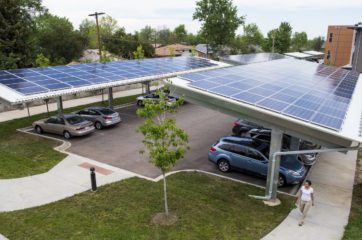Momentum is building in Illinois for the passage of a piece of legislation that would rapidly decarbonize the state’s economy while creating thousands of jobs in the clean energy sector.
The bill, called the Clean Energy Jobs Act (CEJA), would build on previous progress accomplished by the 2016 Future Energy Jobs Act, which set the state on a path to source 25% of its electricity from renewables by 2025. CEJA would create more ambitious targets, requiring the state to have 100% renewable energy by 2050 and eliminate carbon pollution from power plants by 2030. CEJA was not enacted during the most recent legislative session, but advocates are hoping that the legislature moves forwards with it during this November’s veto session.
This would be unprecedented progress for Illinois, a state that ranks 4th in the nation for coal production and currently sources only 6.9% of its electricity from renewables. Parts of the state are also economically dependent on coal mining. If CEJA is passed in Illinois, it could set an important precedent for other fossil fuel-dependent states that will need to transition to renewable energy while protecting workers in industries that are quickly becoming obsolete.
What does CEJA do?
CEJA is a complex, multifaceted bill, and a Senate version filed in February 2019 is hundreds of pages long. To save you some dense reading, here are a few takeaways:
- Capacity Market Reform: A recent ruling from the Federal Energy Regulatory Commission (FERC) sets price floors for state-subsidized renewable energy sources in capacity markets. This was a highly political move by a commission headed by a Trump appointee, and was tantamount to a bailout for uncompetitive coal plants. The FERC price floor is costing Illinoians as much as $864 million per year in increased utility bills. CEJA would give the Illinois Power Agency (IPA) the authority to oversee a Carbon-Free Capacity Market that would not be subject to the FERC regulation, thus cutting utility bills while promoting clean energy.
- Making Polluters Pay: levies fees on fossil fuel power plant emissions, as well as an excise tax on coal production, and uses the revenue to invest hundreds of millions of dollars in a just transition away from fossil fuels.
- Renewable Energy, Transportation Electrification: directs the Illinois EPA to create a plan that will facilitate a complete elimination of power plant carbon emissions by 2030. It will also incentivize electrification of mass transit and provide funds to support low-income folks purchasing electric vehicles.
- Equity: Threaded throughout the legislation are a number of programs that serve minorities, low-income communities, and communities that may be economically impacted by the transition away from fossil fuels.
-
- The IPA is asked to take into account diversity considerations in hiring and contracting when choosing renewable electricity projects.
- $20 million per year is provided to support entrepreneurs looking to start small renewable energy businesses. Entrepreneurs that serve or represent disadvantaged communities are prioritized.
- “Clean Jobs Workforce Hubs” are set up throughout Illinois that will assist with job training for underprivileged workers and former fossil fuel industry employees.
- CEJA creates a Displaced Energy Workers Bill of Rights that includes protections such as a requirement that workers affected by plant closures be provided with one year of healthcare by their employer. Gavin Taves at the Illinois Environmental Council told Climate XChange that these measures are intended “to make sure that those workers who don’t deserve to be punished for the work that they’ve done have access to new opportunities going into the future.”
- A large portion of the money from the polluter fees and coal excise tax goes to support communities that may lose property tax revenue when fossil fuel plants or coal mines close. CEJA also sets aside millions of dollars to help displaced fossil fuel workers find new jobs.
Who supports CEJA?
The key interest groups advocating for CEJA are united in the Illinois Clean Jobs Coalition (CJC). Naturally, CJC includes traditional environmental advocacy groups such as the Environmental Defense Council, the Sierra Club, and the Natural Resources Defense Council.
There are also a variety of social and environmental justice groups that have been attracted to the coalition by CEJA’s strong protections for minorities and low-income communities. Dawn Dannenbring, the environmental justice organizer at Illinois People’s Action, said in an interview with Climate XChange that “CEJA is the perfect blueprint for what a federal bill could look like; what a Green New Deal could look like; as long as equity issues are not negotiated away.”
A variety of non-environmentally focused groups are also working for passage of the policy. For example, Brain Urbaszewski has been working on clean air for the Respiratory Health Association for about 20 years, and told Climate XChange that “the Clean Energy Jobs Act falls squarely in that area of our work.” He is particularly hopeful about components of the bill that will improve air quality in Chicago by promoting the use of electric vehicles.
Another major group supporting CEJA is the Citizens Utility Board, a consumer advocacy group that works to lower utility rates in Illinois. David Kolata, the executive director of Citizens Utility Board, says that CUB supports the bill because it guarantees a minimum of 5% savings relative to what consumers currently pay, and because it improves energy efficiency and undermines the recent FERC ruling.
Encouragingly, recent poll data suggests that CEJA enjoys remarkably broad public support in Illinois, even in the midst of pandemic and a recession. Over 80% of Illinoians support it, including 98% of Democrats, 84% of independents, and 58% of Republicans. It also has more than 70% support in every geographic area of the state.
How has CEJA been impacted by COVID?
A crucial question faced by CEJA advocates is how its prospects will change due to the pandemic and economic recession. Many had hoped that the bill would be passed during the most recent legislative session, which ended in May, but due to the pandemic the legislature only met for a few days and did not move on the bill. Michelle Knox, the owner and founder of a renewable energy firm called WindSolarUSA, says that “just from the fact that our legislators haven’t been in session, I think that [COVID] is hurting CEJA.”
However, many believe that CEJA is well-positioned to contribute to solutions for both the pandemic and the economic recession. By creating jobs in the renewable energy sector, cutting utility rates, and improving protections for workers, the bill can help average Illinoians weather a difficult economy.
The U.S. has also seen an upwelling of outrage against racial injustice, and since the pandemic started, it has been clear that communities of color are being disproportionately impacted by COVID-19. The climate crisis is similarly skewed when it comes to impacts on disadvantaged communities. “We’re at a point now where I believe you can’t not address those longstanding inequities,” Brian Urbaszewski at the Respiratory Health Association said. “That’s why there are things like community solar, job training programs, etc.” in CEJA.
State Representative Ann Williams, the House sponsor of CEJA, is optimistic about the bill’s prospects. She told Climate XChange that she sees it as “a pre-packaged, ready-to-go way to recover, not just at large, but in the communities that most need help, that are most impacted by COVID and the criminal justice problems.”
The stage is set for Illinois to become a leader of the Midwest in combating the climate crisis.









